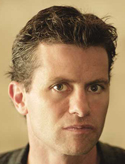Interview Roundup
- In Nextbook, Nelly Reifler interviews Lee Greenfeld about coming to terms with mortality when you’re an atheist. Elsewhere on the site, A.B. Yehoshua weighs in on the Israeli/Lebanese conflict and turns on his interviewer for invoking the Talmud:
“You think people read the Talmud? People know what the Talmud says? Where in the Talmud does it talk about bombing with airplanes or not? And what if the Talmud does say it’s okay to kill the Christians. And I decide I don’t want to kill them. I am building my identity, in a moral way. Why should I be answerable to the Talmud? And anyway, have any American Jews read the Talmud?”
- Stephen Dixon talks to Failbetter.com about End of I., a sequel of sorts to I, and why you shouldn’t ask him what it’s all about: “I just write; I have no plan of attack. I don’t think of hybrids, character studies, metafiction. Whatever I’m doing and have done will have to be explained by other people who know my work better or differently than I do. I’m just the writer.”
13 August 2006 | interviews |
Craig Clevenger Interviews Sara Gran
I’m just going to step back and let Craig Clevenger, the author of Dermaphoria, introduce you to Sara Gran and her new novel, Dope.
 Craig Clevenger: One-Eyed Fred, Fifty-third Street Jackson, Nuthouse Jim, and “…at least a dozen guys who went by Nick the Greek” are among the unwashed and unwanted characters wandering the 1950s Manhattan of Dope. One of them is the who in the story’s whodunit, but the real nemesis of narrator Josephine “Joe” Flannigan is a silent monkey on her back that she’s kept subdued for two years as the novel begins. Heroin, though, is the only habit our heroine can kick; she’s been paying for food and rent with the same sticky fingers that once fed her drug addiction. But when, after being hired to find a missing young socialite, Joe eyes her first stash in two years (“a pile of brown powder…as big as a half dollar and almost as high”), her sleeping monkey wakes up screaming.
Craig Clevenger: One-Eyed Fred, Fifty-third Street Jackson, Nuthouse Jim, and “…at least a dozen guys who went by Nick the Greek” are among the unwashed and unwanted characters wandering the 1950s Manhattan of Dope. One of them is the who in the story’s whodunit, but the real nemesis of narrator Josephine “Joe” Flannigan is a silent monkey on her back that she’s kept subdued for two years as the novel begins. Heroin, though, is the only habit our heroine can kick; she’s been paying for food and rent with the same sticky fingers that once fed her drug addiction. But when, after being hired to find a missing young socialite, Joe eyes her first stash in two years (“a pile of brown powder…as big as a half dollar and almost as high”), her sleeping monkey wakes up screaming.
There’s a reason I like noir. Good writing, especially good noir writing, examines the world as seen looking up from the bottom, illuminating life in a way that the perfect universe of pop culture cannot and will not. Sara Gran’s Dope is true noir at its baddest.
Sara, you have a deep understanding of mid-century New York’s con artist and grifter communities, and a real affection for them, as well. Where do these come from?
Sara Gran: Well, I’m from New York—until recently I’d been in Brooklyn all my life. A lot of the landmarks in the book like the Automat, Gimbel’s, or Alexander’s were still around when I was a kid. The Bowery was still very much the Bowery; Times Square was not the New York Disneyland. Three-card monte dealers and shell games lined Broadway. So even though the book takes place 50-plus years ago, it still felt like my New York.
11 June 2006 | interviews |

 Our Endless and Proper Work is my new book with Belt Publishing about starting (and sticking to) a productive writing practice.
Our Endless and Proper Work is my new book with Belt Publishing about starting (and sticking to) a productive writing practice. 
